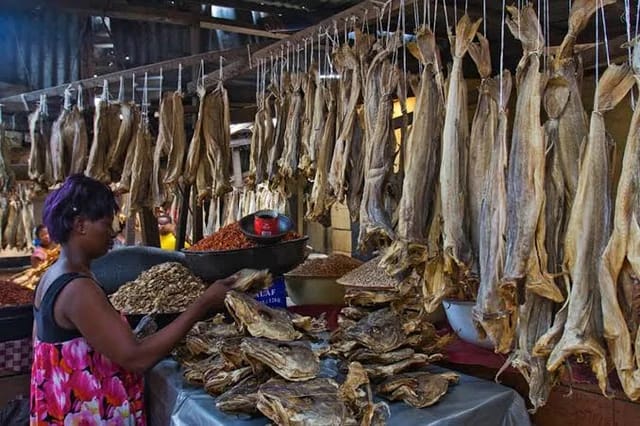Norway crashes fish price for Nigeria over poor sales
Despite a reduction in the price of fish for Nigeria by Norway, importers have significantly cut shipments of various species to seaports due to the high exchange rate of the naira against the dollar and the backlogs of unsold stocks in cold rooms.
Nigeria is currently facing a 2.2 million tonnes fish deficit, estimated to cost $1.2 billion, contributing to soaring prices in the local market.
Between September 2024 and October 8, no vessels ferried fish to Lagos Port, primarily due to the economic hardships affecting consumers.
Data from the World Bank indicated that in 2023, Nigerian ports received 226,263 tonnes (22.6 million kilogrammes) of chilled fish valued at $32 million, contrasting sharply with the annual imports of 2.2 million tonnes from countries such as Norway, Ireland, the Faeroe Islands, Argentina, and Chile.
In a bid to revive the sluggish exports, Norway reduced the price of stock fish in July 2024 to attract Nigerian importers.
Reports indicate that in July 2024, only 89 tonnes were sold to Nigeria, marking the highest growth in export value to Nigeria since the start of the year, amounting to $564,192 (NOK6 million) or an impressive 266 percent increase compared to the same month the previous year.
Eivind Hestvik Brækkan, an analyst at the Norwegian Seafood Council (NSC), noted that stockfish varieties such as saithe, tusk, and cod were exported to Nigeria in July.
He added that the dried fish sold in this market is priced significantly lower than those exported to Italy. However, despite the increase in July, the market situation in Nigeria remains precarious, as a weak naira exacerbates the cost of imported goods.
READ ALSO: Senate to assess, intervene in fuel price hike if necessary – Akpabio
Investigations by the Nigerian Ports Authority (NPA) revealed that no vessels have berthed with fish at Lagos Ports since September 2024 until October 8.
However, shipping data from the ENL Consortium terminal showed that several vessels, including Pamyat Kirova and Crown Ruby, delivered a total of 45,170 tonnes of fish valued at N73.6 billion ($51.9 million) between January and April 2024.
This figure accounted for only 1.8 percent of the 2.5 million tonnes fish deficit needed in the country, where current demand has surged to 3.6 million metric tonnes annually.
Last year, imports of fish from Norway to Nigeria dropped by 5.9 percent, from ₦3.4 billion to ₦3.2 billion, largely due to forex restrictions imposed by the Central Bank of Nigeria (CBN).
Mr. Tronds Kostveit, Director for Africa at the NSC, stated that Nigeria remains the largest importer of Norwegian seafood, having imported a total of 43,251 metric tonnes of various fish last year.
Mackerel led the imports with 14,997 metric tonnes, followed by herring at 13,845 metric tonnes, while stockfish recorded 10,740 metric tonnes.
As of September 2024, no fish vessels were expected to dock at Lagos Port due to escalating costs and high foreign exchange rates.
Vicky Haastrup, Chairman of the Seaport Terminal Operators of Nigeria (STOAN) and CEO of ENL Consortium, confirmed the lack of fish vessels at the ports, stating, “As I’m talking today, we are not expecting any fish vessels at ENL.
A lot of fish vessels used to call at ENL regularly, but now we are not expecting any throughout this month. This is because fish has become very expensive for Nigerians.”
Follow the Neptune Prime channel on WhatsApp: https://whatsapp.com/channel/0029Va74ZvU2v1IqKByXoX3d
Do you have breaking news, interview request, opinion, suggestion, or want your event covered? Email us at neptuneprime2233@gmail.com
Follow the Neptune Prime channel on WhatsApp: https://whatsapp.com/channel/0029Va74ZvU2v1IqKByXoX3d
Do you have breaking news, interview request, opinion, suggestion, or want your event covered? Email us at neptuneprime2233@gmail.com


